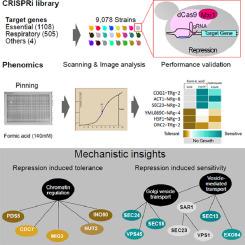Formic acid is one of the main weak acids in lignocellulosic hydrolysates that is known to be inhibitory to yeast growth even at low concentrations. In this study, we employed a CRISPR interference (CRISPRi) strain library comprising >9000 strains encompassing >98% of all essential and respiratory growth-essential genes, to study formic acid tolerance in Saccharomyces cerevisiae. To provide quantitative growth estimates on formic acid tolerance, the strains were screened individually on solid medium supplemented with 140 mM formic acid using the Scan-o-Matic platform. Selected resistant and sensitive strains were characterized in liquid medium supplemented with formic acid and in synthetic hydrolysate medium containing a combination of inhibitors. Strains with gRNAs targeting genes associated with chromatin remodeling were significantly enriched for strains showing formic acid tolerance. In line with earlier findings on acetic acid tolerance, we found genes encoding proteins involved in intracellular vesicle transport enriched among formic acid sensitive strains. The growth of the strains in synthetic hydrolysate medium followed the same trend as when screened in medium supplemented with formic acid. Strains sensitive to formic acid had decreased growth in the synthetic hydrolysate and all strains that had improved growth in the presence of formic acid also grew better in the hydrolysate medium. Systematic analysis of CRISPRi strains allowed identification of genes involved in tolerance mechanisms and provided novel engineering targets for bioengineering strains with increased resistance to inhibitors in lignocellulosic hydrolysates.


